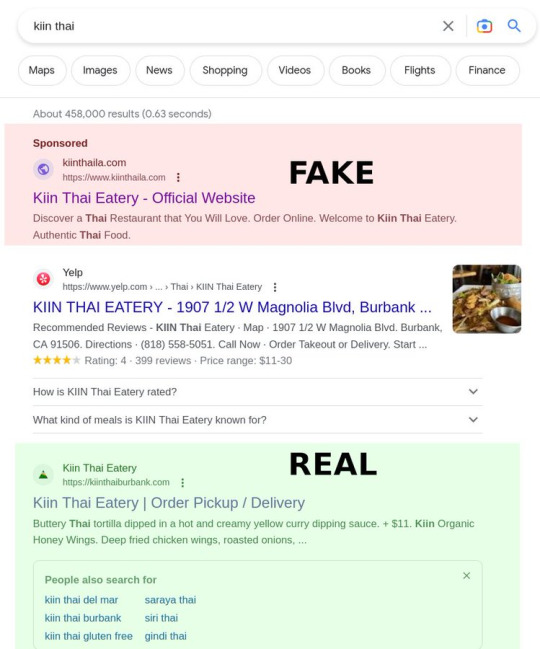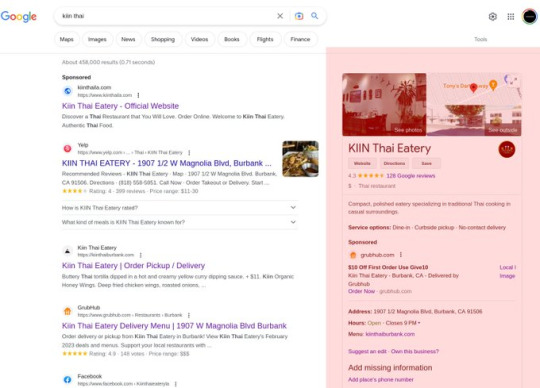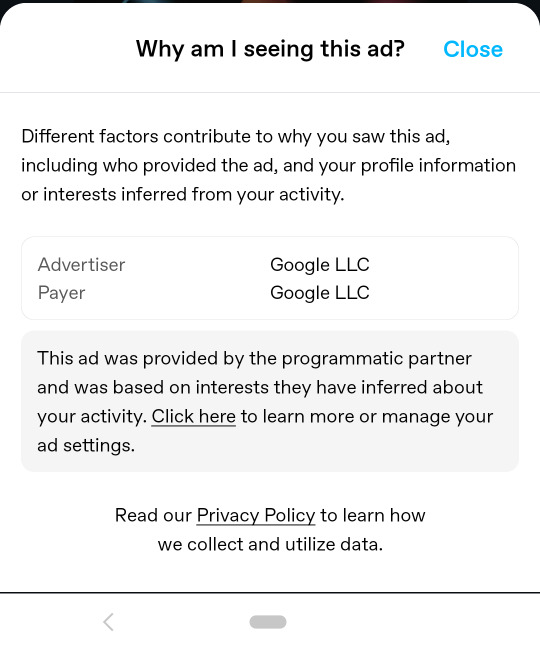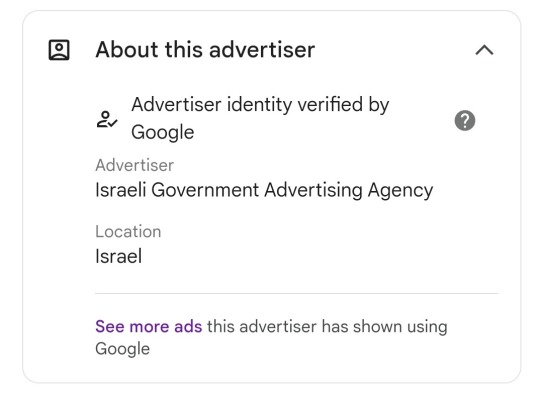#google ads
Text
There’s never just one ant
So there's a great Thai restaurant in my neighborhood called Kiin. Yesterday, I searched for their website to order some takeout. Here's the Google result.

That top result (an ad)? It's fake. It goes to https://kiinthaila.com, which is NOT the website for Kiin.
The *third* result is real: https://kiinthaiburbank.com
Fake site:

Real site:

I got duped. I placed an order with the fake site. The fake site then placed the order - in my name! - with the real site, having marked up the prices by 15%. Kiin clearly knows they're doing this (presumably by the billing data on the credit card the fakesters use to place the order). They called me within minutes to tell me they'd cancelled the fakesters' order.
I could still come pick it up, but I'd have to pay them, and cancel the payment to the fakesters with Amex. Actually, as it turns out, I have to cancel TWO payments, because the fakesters DOUBLE-charged me.
Here's what that charge looks like on my Amex bill. See that phone number? (415) 639-9034 is the number for Wix, who provides the scammers' website.

How the actual FUCK did these obvious scammers get an Amex merchant account in the name of "KIINTHAILA" by after supplying the phone number for a website hosting company? What is Amex's KYC procedure? Do they even call the phone number?
And why the actual FUCK is Google Ads accepting these scam artists' ads for a business that they already have a knowledge box for?! Google KNOWS what the real KIIN restaurant is, and yet they are accepting payment to put a fake KIIN listing two slots ABOVE the real one.

To be fair to these scammer asshole ripoff creeps who are trying to steal from my local mom-and-pop, single location Thai eatery, they're just following in the shoes of Doordash and Uber Eats, who did the same thing to hundreds (thousands?) of restaurants during lockdown.
Doug Rushkoff says that the ethic of today's "entrepreneur" is to “Go Meta��� - don't provide a product or a service, simply find a way to be a predatory squatter on a chokepoint between people who do useful things and people who use those things.
These parasites have turned themselves into landlords of someone else's home, collecting rent on a property they don't own and have no connection to.
There's NEVER just one ant. I guaran-fucking-tee you that these same creeps have 1,000 other fake Wix websites with 1,000 fake Amex merchant accounts for 1,000 REAL businesses, and that Google has sold them ads for every one of them. Amex and Google and Wix should be able to spot these creeps FROM ORBIT. Holy shit do we live in the worst of all possible timelines. We have these monopolist megacorps that spy on and control everything we do, wielding the most arbitrary and high-handed authority.
And yet they do NOT ONE FUCKING THING to prevent these petty scammers from using their infra as force-multipliers to let them steal from every hungry person patronizing every local restaurant.
I mean, what's the point of letting these robber-barons run the entire show if they're not even COMPETENT?
ETA: Dinner was delicious
11K notes
·
View notes
Text
*Banging drum* USE FIREFOX! USE FIREFOX! USE FIREFOX!
49 notes
·
View notes
Text
𝗙𝗲𝗲𝗹𝗶𝗻𝗴 𝘁𝗵𝗲 𝗳𝗿𝘂𝘀𝘁𝗿𝗮𝘁𝗶𝗼𝗻 𝗼𝗳 𝗚𝗼𝗼𝗴𝗹𝗲’𝘀 𝗹𝗮𝘁𝗲𝘀𝘁 𝗮𝗹𝗴𝗼𝗿𝗶𝘁𝗵𝗺 𝘂𝗽𝗱𝗮𝘁𝗲?

Watching your website drop to the 𝟔𝐭𝐡 𝐩𝐚𝐠𝐞 can be tough, but we’re here to help. Our expert strategies are designed to get your rankings back on track, so you can regain your spot at the top.
Don’t let the update hold you back—follow @uxtitan_official l for recovery tips and more SEO insights.
#billford#hugh jackman#artists on tumblr#batman#bill cipher#deadpool and wolverine#dungeon meshi#gravity falls#house of the dragon#jujutsu kaisen#meme#funny memes#dank memes#tumblr memes#memedaddy#funny#humor#funny meme#lol#haha#seo#seo services#digital marketing#search engine optimization#google ads#search engine marketing#emailmarketing#seo changbin#seonghwa#kim seokjin
28 notes
·
View notes
Text
#united nations relief and works agency for palestine refugees in the near east (unrwa)#refugees#palestinian refugees#israel#google ads#social media#wired
47 notes
·
View notes
Video
Lucky Strike Means Fine Tobacco (1943) promotional short with Frank Sinatra and Kay Kyser.
32 notes
·
View notes
Text
Anytime advertising tries to act like my friend or like it’s “just another user of the site”, I am instantly filled with a blinding rage. If it’s blatant and honest about its intentions then I’m mildly annoyed to have to deal with it at worst. But the second it rolls up and starts elbowing me like “ heyyyy old buddy we use meme and or are a totally normal internet user that happens to be recommending this product, heres a link” the part of my brain that identifies foes goes “Ah a threat attempting to slip past your guard, react with extreme prejudice” and I attempt to find a way to destroy that ad and the entire mechanism that created it.
18 notes
·
View notes
Text
E não somente isso, mas também nos gloriamos nas tribulações, sabendo que a tribulação produz a paciência, E a paciência, a experiência; e a experiência, a esperança. E a esperança não desaponta, porquanto o amor de Deus está derramado em nosso coração pelo Espírito Santo que nos foi dado.
9 notes
·
View notes
Text

It's like an augmented reality where capitalism doesn't exist
youtube
youtube
#It's like an augmented reality where capitalism doesn't exist#earth#reality#ublock origin#advertising#marketing#george carlin#bill hicks#they live#advertisements#rp advert#google ads#tumblr ads#vintage ads#krp ads#ads#ad#ausgov#politas#auspol#tasgov#taspol#australia#fuck neoliberals#neoliberal capitalism#anthony albanese#albanese government#mkultra#brainwashing#television
10 notes
·
View notes
Text


Guys-
The shoe store thing-
#memes#idk lmao#hehehe#welp#jojo no kimyou na bouken#jjba#diamond is unbreakable#kira yoshikage#found on reddit#ad from Reddit#google ads#to many tags#part 4
14 notes
·
View notes
Text
Google makes millions on paid abortion disinformation

Google’s search quality has been in steady decline for years, and Google assures us that they’re working on it, though the most visible effort is replacing links to webpages with lengthy, florid paragraphs written by a confident habitual liar chatbot:
https://pluralistic.net/2023/02/16/tweedledumber/#easily-spooked
The internet is increasingly full of garbage, much of it written by other confident habitual liar chatbots, which are now extruding plausible sentences at enormous scale. Future confident habitual liar chatbots will be trained on the output of these confident liar chatbots, producing Jathan Sadowski’s “Habsburg AI”:
https://twitter.com/jathansadowski/status/1625245803211272194
But the declining quality of Google Search isn’t merely a function of chatbot overload. For many years, Google’s local business listings have been terrible. Anyone who’s tried to find a handyman, a locksmith, an emergency tow, or other small businessperson has discovered that Google is worse than useless for this. Try to search for that locksmith on the corner that you pass every day? You won’t find them — but you will find a fake locksmith service that will dispatch an unqualified, fumble-fingered guy with a drill and a knockoff lock, who will drill out your lock, replace it with one made of bubblegum and spit, and charge you 400% the going rate (and then maybe come back to rob you):
https://www.nytimes.com/2016/01/31/business/fake-online-locksmiths-may-be-out-to-pick-your-pocket-too.html
Google is clearly losing the fraud/spam wars, which is pretty awful, given that they have spent billions to put every other search engine out of business. They spend $45b every year to secure exclusivity deals that prevent people from discovering or using rivals — that’s like buying a whole Twitter every year, just so they don’t have to compete:
https://www.thebignewsletter.com/p/how-a-google-antitrust-case-could/
But there’s an even worse form of fraudulent listing on Google, one they could do something about, but choose not to: ad-fraud. For all the money and energy thrown into “dark SEO” to trick Google into putting your shitty, scammy website at the top of the listings, there’s a much simpler method. All you need to do is pay Google — buy an ad, and your obviously fraudulent site will be right there, at the top of the search results.
There are so many top searches that go to fraud or malware sites. Tech support is a favorite. It’s not uncommon to search for tech support for Google products and be served a fake tech-support website where a scammer will try to trick you into installing a remote-access trojan and then steal everything you have, and/or take blackmail photos of you with your webcam:
https://www.bleepingcomputer.com/news/security/google-search-ads-infiltrated-again-by-tech-support-scams/
This is true even when Google has a trivial means of reliably detecting fraud. Take the restaurant monster-in-the-middle scam: a scammer clones the menu of a restaurant, marking up their prices by 15%, and then buys the top ad slot for searches for that restaurant. Search for the restaurant, click the top link, and land on a lookalike site. The scammer collects your order, bills your card, then places the same order, in your name, with the restaurant.
The thing is, Google runs these ads even for restaurants that are verified merchants — Google mails the restaurant a postcard with a unique number on it, and the restaurant owner keys that number in to verify that they are who they say they are. It would not be hard for Google to check whether an ad for a business matches one of its verified merchants, and, if so, whether the email address is a different one from the verified one on file. If so, Google could just email the verified address with a “Please confirm that you’re trying to buy an ad for a website other than the one we have on file” message:
https://pluralistic.net/2023/02/24/passive-income/#swiss-cheese-security
Google doesn’t do this. Instead, they accept — and make a fortune from — paid disinformation, across every category.
But not all categories of paid disinformation are equally bad: it’s one thing to pay a 15% surcharge on a takeout meal, but there’s a whole universe of paid medical disinformation that Google knows about and has an official policy of tolerating.
This paid medical disinformation comes from “crisis pregnancy centers”: these are fake abortion clinics that raise huge sums from religious fanatics to buy ads that show up for people seeking information about procuring an abortion. If they are duped by one of these ads, they are directed to a Big Con-style storefront staffed by people who pretend that they perform abortions, but who bombard their marks with falsehoods about health complications.
These con artists try to trick their marks into consenting to sexual assault — a transvaginal ultrasound. This is a prelude to another fraud, in which the “sporadic electrical impulses” generated by an early fetal structure is a “heartbeat” (early fetuses do not have hearts, so they cannot produce heartbeats):
https://www.nbcnews.com/health/womens-health/heartbeat-bills-called-fetal-heartbeat-six-weeks-pregnancy-rcna24435
If the victim still insists on getting an abortion, the fraudsters will use deceptive tactics to draw out the process until they run out the clock for a legal abortion, procuring a forced birth through deceit.
It is hard to imagine a less ethical course of conduct. Google’s policy of accepting “crisis pregnancy center” ads is the moral equivalent of taking money from fake oncologists who counsel people with cancer to forego chemotherapy in favor of juice-cleanses.
There is no ambiguity here: the purpose of a “crisis prengancy center” is to deceive people seeking abortions into thinking they are dealing with an abortion clinic, and then further deceive them into foregoing the abortion, by means of lies, sexually invasive and unnecessary medical procedures, and delaying tactics.
Now, a new report from the Center for Countering Digital Hate finds that Google made $10m last year on ads from “crisis pregnancy centers”:
https://www.wired.com/story/google-made-millions-from-ads-for-fake-abortion-clinics/
Many of these “crisis pregnancy centers” are also registered 501(c)3 charities, which makes them eligible for Google’s ad grants, which provide free ads to nonprofits. Marketers who cater to “crisis pregnancy center” advertise that they can help their clients qualify for these grants. In 2019, Google was caught giving tens of thousands of dollars’ worth of free ads to “crisis pregnancy centers”:
https://www.theguardian.com/technology/2019/may/12/google-advertising-abortion-obria
The keywords that “crisis pregnancy centers” bid up include “Planned Parenthood” — meaning that if actual Planned Parenthood clinics want to appear at the top of the search for “planned parenthood,” they have to outbid the fraudsters seeking to deceive Planned Parenthood patients.
Google has an official policy of requiring customers that pay for ads matching abortion-related search terms to label their ads to state whether or not they provide abortions, but the report documents failures to enforce this policy. The labels themselves are confusing: for example, abortion travel funds have to be labeled as “not providing abortions.”
Google isn’t afraid to ban whole categories of advertising: for example, Google has banned Plan C, a nonprofit that provides information about medication abortions. The company erroneously classes Plan C as an “unauthorized pharmacy.” But Google continues to offer paid disinformation on behalf of forced birth groups that claim there is such a thing as “abortion reversal” (there isn’t — but the “abortion reversal” drug cocktail is potentially lethal).
This is inexcusable, but it’s not unique — and it’s not even that profitable. $10m is a drop in the bucket for a company like Google. When you’re lighting $45b/year on fire just to prevent competition, $10m is chump change. A better way to understand Google’s relationship to paid disinformation can be found by studying Facebook’s own paid disinformation problem.
Facebook has a well-documented problem with paid political disinformation — unambiguous, illegal materials, like paid notices advising people to remember to vote on November 6th (when election day falls on November 5th). The company eventually promised to put political ads in a repository where they could be inspected by all parties to track its progress in blocking paid disinformation.
Facebook did a terrible job at this, with huge slices of its political ads never landing in its transparency portal. We know this because independent researchers at NYU’s engineering school built an independent, crowdsourced tracker called Ad Observer, which scraped all the ads volunteers saw and uploaded them to a portal called Ad Observatory.
Facebook viciously attacked the NYU project, falsely smearing it as a privacy risk (the plugin was open source and was independently audited by Mozilla researchers, who confirmed that it didn’t collect any personal information). When that didn’t work, they sent a stream of legal threats, claiming that NYU was trafficking in a “circumvention device” as defined by Section 1201 of the Digital Millennium Copyright Act, a felony carrying a five-year prison sentence and a $500k fine — for a first offense.
Eventually, NYU folded the project. Facebook, meanwhile, has fired or reassigned most of the staff who work on political ad transparency:
https://pluralistic.net/2021/08/06/get-you-coming-and-going/#potemkin-research-program
What are we to make of this? Facebook claims that it doesn’t need or want political ad revenue, which are a drop in the bucket and cause all kinds of headaches. That’s likely true — but Facebook’s aversion to blocking political ads doesn’t extend to spending a lot of money to keep paid political disinfo off the platform.
The company could turn up the sensitivity on its blocking algorithm, which would generate more false positives, in which nonpolitical ads are misidentified and have to be reviewed by humans. This is expensive, and it’s an expense Facebook can avoid if it can suppress information about its failures to block paid political disinformation. It’s cheaper to silence critics than it is to address their criticism.
I don’t think Google gives a shit about the $10m it gets from predatory fake abortion clinics. But I think the company believes that the PR trouble it would get into for blocking them — and the expense it would incur in trying to catch and block fake abortion clinic ads — are real liabilities. In other words, it’s not about the $10m it would lose by blocking the ads — Google wants to avoid the political heat it would take from forced birth fanatics and cost of the human reviewers who would have to double-check rejected ads.
In other words, Google doesn’t abet fraudulent abortion clinics because they share the depraved sadism of the people who run these clinics. Rather, Google teams up with these sadists out of cowardice and greed.

If you'd like an essay-formatted version of this thread to read or share, here's a link to it on pluralistic.net, my surveillance-free, ad-free, tracker-free blog:
https://pluralistic.net/2023/06/15/paid-medical-disinformation/#crisis-pregnancy-centers

[Image ID: A ruined streetscene. Atop a pile of rubble sits a dilapidated shack. In front of the shack is a letterboard with the word ABORTIONS set off-center and crooked. In the foreground is a carny barker at a podium, gesturing at the sign and the shack. The barker's head and face have been replaced with the Google logo. Within the barker's podium is a heap of US$100 bills.]

Image:
Flying Logos (modified)
https://commons.wikimedia.org/wiki/File:Over_$1,000,000_dollars_in_USD_$100_bill_stacks.png
CC BY-SA 4.0
https://creativecommons.org/licenses/by-sa/4.0/deed.en
#pluralistic#abortion clinics#forced birth#disinformation#medical disinformation#paid disinformation#google#google ads#ad-tech#seo#kiin thai#locksmiths#abortion#dobbs crisis pregnancy centers#roe v wade
234 notes
·
View notes
Text
so i kept seeing this ad on tumblr

and i got really confused about why it's aimed at me, so i checked who paid for it, and oh boy, whoever you think, you're gonna be wrong

google.
google paid for this ad. like, at this point, they probably have enough data on me to know that i'm not only ace but quite sex-repulsed.
you have all this data on me. you might as well use it and give me relevant ads.
#i also kept getting ads for horse riding equipment despite the fact that i don't like horses#and am scared of them#and don't know how to ride them#so i'm starting to think that my data got mixed up with someone else's#Tumblr#google#Tumblr ads#google ads#ads#asexual#asexuality#tw sex mention
16 notes
·
View notes
Text
from @omarknowsphotos on tiktok
#free palestine#free gaza#gaza#all eyes on rafah#activism#social media#social justice#online activism#google ads#ads#I havent seen this spread around enough on tiktok#tiktok#become ungovernable
16 notes
·
View notes
Text

#backlinks#local seo#google ads#facebook ads#facebook marketing#paypal#cashapp#pay me to be cute#cash app account#verified cash app account#buy verified cash app account#cash app
15 notes
·
View notes
Text


Getting western media on their side isn’t enough, they have to pay google to push their narrative too.
14 notes
·
View notes
Text
𝐖𝐡𝐚𝐭 𝐢𝐬 𝐃𝐢𝐠𝐢𝐭𝐚𝐥 𝐌𝐚𝐫𝐤𝐞𝐭𝐢𝐧𝐠 & 𝐢𝐭𝐬 𝐁𝐞𝐧𝐞𝐟𝐢𝐭𝐬?
𝐃𝐢𝐠𝐢𝐭𝐚𝐥 𝐦𝐚𝐫𝐤𝐞𝐭𝐢𝐧𝐠 𝐢𝐬 𝐩𝐫𝐨𝐦𝐨𝐭𝐢𝐧𝐠 𝐩𝐫𝐨𝐝𝐮𝐜𝐭𝐬 𝐨𝐫 𝐬𝐞𝐫𝐯𝐢𝐜𝐞𝐬 𝐮𝐬𝐢𝐧𝐠 𝐝𝐢𝐠𝐢𝐭𝐚𝐥 𝐜𝐡𝐚𝐧𝐧𝐞𝐥𝐬 𝐥𝐢𝐤𝐞 𝐰𝐞𝐛𝐬𝐢𝐭𝐞𝐬, 𝐬𝐨𝐜𝐢𝐚𝐥 𝐦𝐞𝐝𝐢𝐚, 𝐚𝐧𝐝 𝐞𝐦𝐚𝐢𝐥. 𝐁𝐞𝐧𝐞𝐟𝐢𝐭𝐬 𝐢𝐧𝐜𝐥𝐮𝐝𝐞 𝐰𝐢𝐝𝐞𝐫 𝐫𝐞𝐚𝐜𝐡, 𝐩𝐫𝐞𝐜𝐢𝐬𝐞 𝐭𝐚𝐫𝐠𝐞𝐭𝐢𝐧𝐠, 𝐜𝐨𝐬𝐭-𝐞𝐟𝐟𝐞𝐜𝐭𝐢𝐯𝐞𝐧𝐞𝐬𝐬, 𝐫𝐞𝐚𝐥-𝐭𝐢𝐦𝐞 𝐝𝐚𝐭𝐚, 𝐚𝐧𝐝 𝐞𝐚𝐬𝐢𝐞𝐫 𝐞𝐧𝐠𝐚𝐠𝐞𝐦𝐞𝐧𝐭 𝐰𝐢𝐭𝐡 𝐜𝐮𝐬𝐭𝐨𝐦𝐞𝐫𝐬.

#digital marketing#search engine optimization#social media marketing#youtube marketing#google ads#facebook ads#seo#on page seo#off page seo#leadgeneration
10 notes
·
View notes
Text

Boosting Business Success: Jindal Services' IT Services in Zirakpur
Jindal Services in Zirakpur specializes in boosting business success through a range of IT services including Social Media Marketing, SEO, Web Development, Graphic Designing, Content Writing, Google & Meta Ads. Serving Chandigarh, Mohali, Zirakpur, Panchkula, and the TRI City area, they are a one-stop solution for businesses seeking to enhance their online presence and reach their target audience effectively.
📞+91 9915443614
📍https://jindalservices.org/
#pg accommodations#social media marketing#seo#google ads#digital marketing#content writing#graphic designing#web development
10 notes
·
View notes